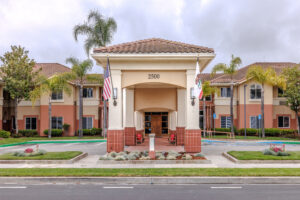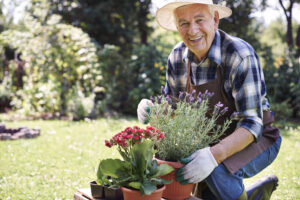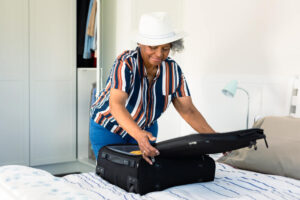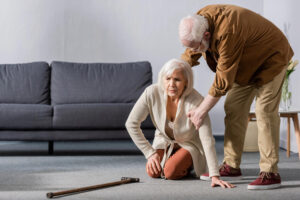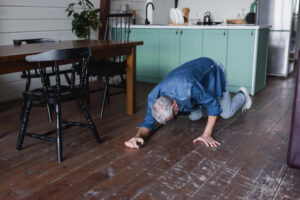Social distancing is one of the recommendations by the Centers for Disease Control and Prevention to help stop the spread of coronavirus disease 2019 (COVID-19). In the state of California, Governor Gavin Newsom signed an executive order mandating gatherings larger than 250 people to be canceled or postponed until at least the end of March, while smaller events can proceed only if the organizers can implement social distancing of 6 feet per person. All of these measures have put a halt on programming and social networks that many older people who aren’t assisted living residents take part in every day. Our Erasing Boundaries dementia inclusive community-based programs in the San Francisco Bay Area are postponed. Many older adults are now stuck at home.
“Social distancing is such an important measure to protect the people what we work with,” Elder Care Alliance Dementia-Inclusive Communities Director Sadie Harmon said. “One consequence, though, of canceling programming for social connection is that people impacted by dementia, who are already at risk of isolation, may feel further disconnected.”
Social isolation and loneliness is an emerging public health crisis itself, especially for older adults. The National Academy of Sciences just released a report that outlines the many links between poor social connection and negative health outcomes for older adults, including an increased risk of cognitive decline and dementia. It is possible to keep people connected as we enact necessary measures like social distancing, but we need to be creative and stay committed to doing so.
Focus currently is rightfully so on the transmission and infection of the COVID-19 virus, but how do we continue to support those who are socially isolated and rely on these programs which are currently on hiatus? Things you can do can be quite simple, according to Harmon.
“Throughout this crisis, I am trying to stop and remind myself of the power of the simple connections that happen every day. I called one of my collaborators who lives with dementia a few days ago, and he exclaimed, ‘I’m so happy to hear from you! All of my groups have been canceled, and I suddenly have a lot of time on my hands.’”
Harmon says it’s important right now everyone who participates in dementia inclusive community programming, whether they are care partner, a person living with dementia, or an older adult who is socially isolated, know they are still supported. Their social networks are still here – they are just on physical hiatus for the time being.
The City of San Francisco’s Department of Emergency Management held a webinar about their preparations for COVID-19. In response to a question about supporting people who are isolated, Nicole Bohn from the Mayor’s Office on Disability had some excellent advice. The first step, she said, is to check in with those in your community and network who might be isolated and offer appropriate support where needed. The second is to make sure that people have access to accurate information. This means connecting folks to resources like the City of San Francisco’s Department of Emergency Management, text alerts (you can text COVID19SF to 888-777), the CDC and the California Department of Public Health, and simply calling 311 for general information and support.
Harmon explains sometimes we want to jump immediately into action and to enact sweeping solutions that will instantly solve our problems. These comprehensive solutions take time and lots of coordination from many different people. While we work on that, let’s not forget to check in with the people in our network who might need extra support right now. Let’s remember to say hello to our neighbors, co-workers, family and friends, and see if there’s anything we can do to support one another. Smile at strangers and keep in mind that we are all in this together – we need to continue to check our biases and prejudices and listen to experts as we navigate this crisis.
“That’s why I recommend virtual and remote opportunities for connection and increased communication from our community partners. As social distancing measures continue and potentially intensify, I’m reminding myself and others to make an extra effort to check in with people in their communities and networks who are most impacted,” Harmon said.
Consider established remote-connection programs like Well Connected and Social Call, both through Covia, and the Institute on Aging’s Friendship Line. There are also great, engaging, and many free online programs for all ages.
Kari Rogenski with the Hummingbird Project recommends taking a photo tour with Getty Images; visiting museums online with Google Arts and Culture; learning something new at FactSlides; exploring this day in history at History.com, and enjoying live streams from NASA Live and the Pier 39 Sea Lion webcam. There are many options out there, no matter where you are.
“In our Creative Aging San Francisco Collective and with Creative Aging International, we are working on designing several projects that can connect us remotely through shared creative practice,” Harmon said.
We can come through this crisis better prepared for the future, but we need to keep in mind a few key best practices:
- Listen to experts and make information accessible to your community.
- Don’t panic — take appropriate steps to stay safe and to support others.
- Stay connected and remember that this crisis will disproportionately affect people who are already vulnerable — those of us with resources would do well to safely distribute them to those in need.
- Be creative. Keep up existing creative practices as both a self-care measure and as a way of generating new ideas. Let’s continue to support one another and keep connected!
















